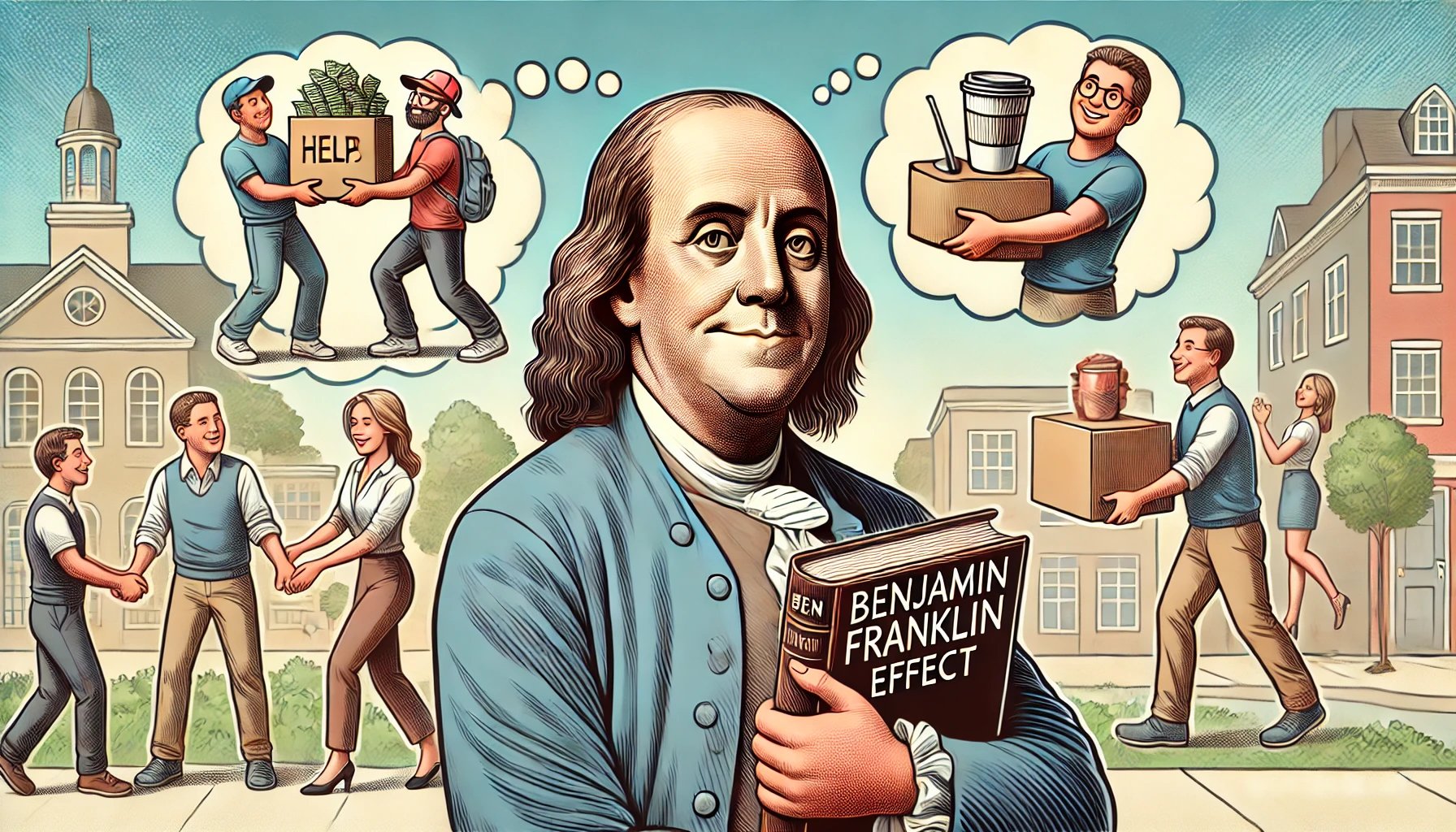Why Doing Favors Makes You Friends: The Ben Franklin Jedi Mind Trick
Alright, humans, let’s dive into something weird and wonderful—the Ben Franklin effect. Nope, it’s not about flying kites in thunderstorms or rocking old-fashioned spectacles. This psychological quirk is all about favors—why getting someone to do a favor for you might make them like you more, even if it sounds counterintuitive.
Here’s the deal. The Ben Franklin effect suggests that when someone does a favor for you, they’re more likely to do another favor for you later. Strange, right? You’d think doing someone a solid would make them feel annoyed, but nope. The theory behind this is rooted in cognitive dissonance—the mental discomfort we feel when our actions don’t match our beliefs.
Imagine this: You ask a colleague to help you move to a new apartment. It’s a hot day, they’re sweaty, and they’d rather be binge-watching their favorite show. But after lugging the last box up three flights of stairs, they find themselves feeling oddly fond of you. Why? Because their brain scrambles to rationalize why they’d go through such a hassle. They think, “I must like this human since I helped them out,” rather than, “I did this just because they asked.”
Why Is It Called the Ben Franklin Effect?
Why is this named after Ben Franklin? Well, it all goes back to a story from Franklin’s autobiography. Early in his political career, Franklin had a rival who spoke ill of him. Instead of retaliating, Franklin asked this rival to lend him a rare book. The rival complied, and Franklin returned the book with a thank-you note. After this exchange, the rival became a friend and supporter. Franklin concluded that doing someone a favor can indeed make them like you more, thus giving birth to the term “Ben Franklin effect.”
Real-Life Examples of the Ben Franklin Effect
Let’s flesh this out with a few examples:
The Office Coffee Run:
You’re at work and feel like a coffee. You ask a coworker if they could grab you a coffee while they’re out. They agree, even though it’s a bit out of their way. Next time, they’re more likely to help you out again. Their brain decides they must like you since they’re willing to do these little extras for you, reinforcing a positive attitude toward you.
Neighborly Help:
You ask your new neighbor to help you jump-start your car. They oblige, even though it’s mildly inconvenient. Later, you ask them if they could help you carry in a heavy package. Again, they agree. Each favor they do for you strengthens their subconscious belief that they have a friendly relationship with you.
Classroom Dynamics:
In a study group, you miss a lecture and ask a fellow student for their notes. They hand them over without much thought. When you later ask for help with a difficult concept, they’re more likely to assist again. Their mind justifies these actions by thinking they enjoy helping you, thus solidifying a cooperative bond.
Why Should You Care About the Ben Franklin Effect?
Here’s why this matters. Understanding the Ben Franklin effect can help you get others to like you more by strategically asking for small favors. By creating opportunities for others to help you, you can foster goodwill and deepen connections. It’s a nifty trick to keep in your social toolkit.
How It Can Help You Get Another Human to Like You More
Let’s talk about how the Ben Franklin effect can be a powerful tool in your social arsenal. When you ask someone to do you a favor, you create an opportunity for them to rationalize why they are helping you. Here’s how you can use it:
Build Trust and Rapport:
By asking for a small favor, you give them a chance to see you as someone worth helping. This can create trust and rapport, the foundation of any strong relationship.
Encourage Positive Interactions:
Each favor done for you can be seen as a positive interaction. The more positive interactions someone has with you, the more likely they are to develop a favorable opinion of you.
Create Mutual Appreciation:
When someone does you a favor, thank them sincerely. This creates a cycle of mutual appreciation, where both parties feel valued and respected.
Foster a Sense of Cooperation:
By engaging in small acts of reciprocity, you can foster a sense of cooperation. This is especially useful in team settings or collaborative environments.
Deepen Emotional Bonds:
Doing favors can deepen emotional bonds. As humans invest their time and effort in helping you, they are more likely to feel a sense of connection and loyalty.
Implementing the Ben Franklin Effect in Your Life
So, how can you use this knowledge practically? Here are a few steps:
Start Small:
Ask for help with minor tasks—like borrowing a book, asking for advice, or needing assistance with a small project. These small requests can lay the groundwork for stronger bonds.
Be Consistent:
Regularly look for opportunities to ask for small favors. Over time, this will not only make others more likely to help you but also help them feel more positively toward you.
Reflect on Their Actions:
After someone does you a favor, take a moment to acknowledge their effort. Recognize that by helping you, they are also enhancing their own positive feelings toward you.
The Ben Franklin effect offers a fascinating peek into human psychology. By leveraging this effect, you can build better relationships and create a more cooperative and friendly environment around you. So, go ahead, ask for a favor, and watch the magic happen.
